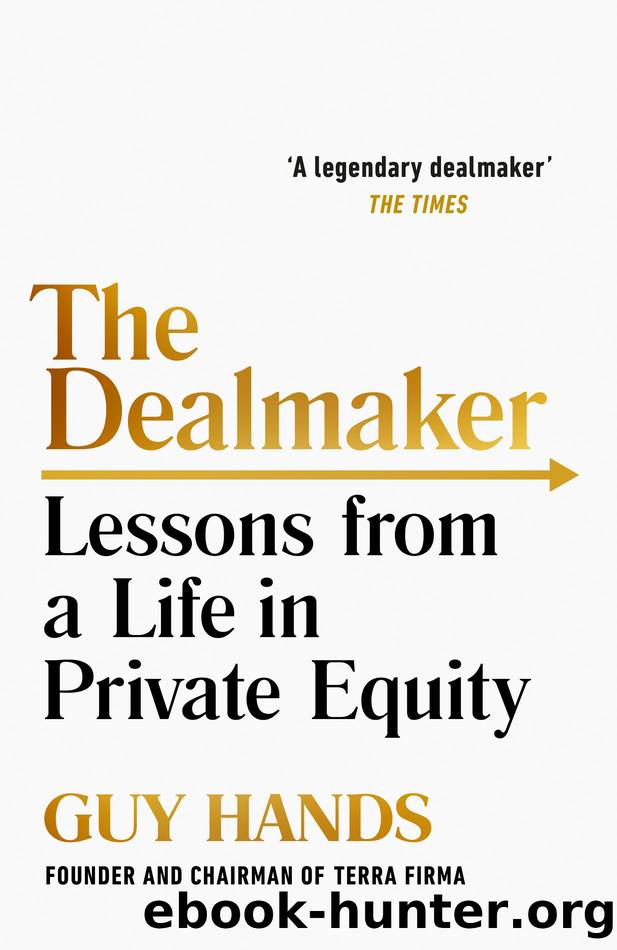The Dealmaker by Guy Hands

Author:Guy Hands [Hands, Guy]
Language: eng
Format: epub
Publisher: Penguin Books Ltd
Published: 2021-11-04T00:00:00+00:00
CHAPTER 9
Facing the Music
When I was younger, so much younger than today
I never needed anybodyâs help in any way
But now these days are gone, Iâm not so self-assured
Now I find Iâve changed my mind and opened up the doors
THE BEATLES,
âHelp!â
We had bought the dog, the bankers were applauding the most audacious deal of the year and my team were celebrating the end of an extremely difficult process. I knew, though, that such celebrations were premature. Experience had taught me that the really hard work actually starts when the ink is dry. After all, now itâs your money on the line. Furthermore, I was acutely aware that with 30 per cent of our two flagship funds now invested in the EMI deal weâd broken in a single stroke the two cardinal rules of private equity: keep your investment in any one company below 10 per cent and avoid cross-fund investments, so that one bad investment doesnât infect the results of other funds. What I hoped and assumed was that we would be able to sell enough of the company down to bring our holdings below 10 per cent.
When we started looking at EMI the market was as hot as it had been just before the dot-com crash in 2000. By the time we closed, things had cooled down enormously. The flow of cheap money that had been hiding all faults had largely disappeared. As Warren Buffett had said back in 2004 in one of his investorsâ letters: âItâs only when the tide goes out that you discover whoâs been swimming naked.â I was about to feel very exposed.
Closing the deal in August 2007 in the teeth of the financial crisis meant the chances of selling the deal down were becoming less likely by the day. I had no idea that as early as June 2006, Richard M. Bowen, the chief underwriter at Citigroupâs Consumer Lending Group, had begun warning the board that they had a problem. Like most other financial conglomerates, Citigroup held massive portfolios of collateralised debt obligations (CDOs) and mortgage-backed securities (MBSs) â the majority of which were subprime. The company had used elaborate mathematical risk models that looked at mortgages in particular geographical areas but did not allow for the possibility of a national housing downturn, or the possibility that millions of mortgage holders might default on their mortgages. For a group that bought and sold $90 billion worth of residential mortgages annually, this lack of risk assessment seems surprising.
At the time Bowen warned the board that at least 60 per cent of Citigroupâs mortgages were defective in some way. Within a year that initial figure had been revised upwards to 80 per cent. He was ignored. Even after Bear Stearns nearly went under in summer 2007, Citigroup believed that the likelihood of trouble with its CDOs was so tiny that it excluded them from its risk analysis.
The Terra Firma team as a whole remained very confident that we would be able to sell down at least two thirds of our investment in EMI.
Download
This site does not store any files on its server. We only index and link to content provided by other sites. Please contact the content providers to delete copyright contents if any and email us, we'll remove relevant links or contents immediately.
| Private Equity | Valuation |
| Venture Capital |
The Black Swan by Nassim Nicholas Taleb(7110)
Bad Blood by John Carreyrou(6611)
Pioneering Portfolio Management by David F. Swensen(6289)
Millionaire: The Philanderer, Gambler, and Duelist Who Invented Modern Finance by Janet Gleeson(4469)
Skin in the Game by Nassim Nicholas Taleb(4239)
The Money Culture by Michael Lewis(4198)
Bullshit Jobs by David Graeber(4179)
Skin in the Game: Hidden Asymmetries in Daily Life by Nassim Nicholas Taleb(3992)
The Wisdom of Finance by Mihir Desai(3735)
Blockchain Basics by Daniel Drescher(3574)
Liar's Poker by Michael Lewis(3441)
Fooled by Randomness: The Hidden Role of Chance in Life and in the Markets by Nassim Nicholas Taleb(3108)
Hands-On Machine Learning for Algorithmic Trading by Stefan Jansen(3067)
The Intelligent Investor by Benjamin Graham Jason Zweig(3036)
Mastering Bitcoin: Programming the Open Blockchain by Andreas M. Antonopoulos(3035)
The Power of Broke by Daymond John(2975)
Investing For Dummies by Eric Tyson(2948)
You Are What You Risk by Michele Wucker(2783)
Market Wizards by Jack D. Schwager(2697)
